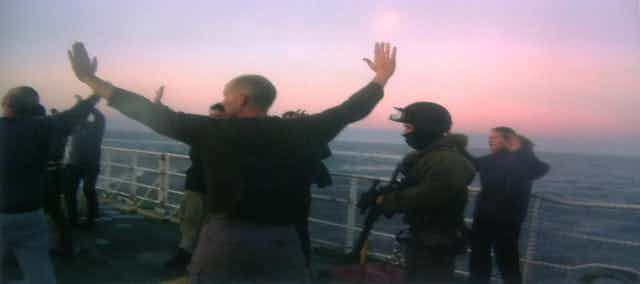All 30 crew of Dutch Greenpeace vessel Arctic Sunrise, including an Australian, have been detained and charged with piracy by Russian authorities, after attempting to board an oil platform in the Arctic.
Russian authorities allege that the Greenpeace protesters attacked and attempted to seize the platform, while Greenpeace claims that they simply were attempting mount a protest poster.
Piracy is defined in the United Nations Convention on the Law of Sea (UNCLOS), and the activists would be charged in Russian courts depending on Russian interpretation of the Law.
The question is how the Law of the Sea is interpreted, and whether the Greenpeace crew have actually committed piracy.
Private ends and violence
This isn’t the first time environmental activists have been accused of piracy. In February this year the Sea Shepherd activists were found by US courts to have committed piracy for their conduct in the Southern Ocean, under the Law of the Sea. The case hinged on interpretation of Article 101(a) of UNCLOS, which states that piracy is:
any illegal acts of violence or detention, or any act of depredation, committed for private ends by the crew or the passengers of a private ship or a private aircraft … on the high seas, against another ship or aircraft, or against persons or property on board such ship or aircraft.
I personally remain unconvinced of the finding of piracy in the Sea Shepherd case for reasons you can read about here.
But in the Greenpeace case the charges of piracy have even less weight. The critical issue in the Sea Shepherd case of “private ends” isn’t even relevant. Video footage suggests that the violence requirement of Article 101(a) hasn’t been met.
Ships and oil platforms
Even if the violence requirement for the crime of piracy had been met, the Law of the Sea requires the crime must still be committed “against another ship”, not an oil platform. This makes it impossible for the Greenpeace action to be piracy under UNCLOS.
Another law that might be called into use is the international Convention for the Suppression of Unlawful Acts against the Safety of Maritime Navigation (SUA), brought into being to deal with maritime violence beyond piracy, including hijacking.
SUA has the same problem as UNCLOS - it doesn’t include oil platforms because they are fixed platforms rather than vessels - however, the 2005 protocol does cover acts threatening the safety of fixed platforms.
The protocol sets out a number of offences against the safety of fixed platforms, all of which involve some form of violence. But in the Greenpeace case there doesn’t seem to have been any conduct by activists that would violate this law.
High seas
When this is combined with the fact that the Arctic Sunrise was on the high seas outside of national jurisdiction, there doesn’t appear to be any legal ground for the detention of the vessel or her crew.
Had they been in Russia’s territorial sea then they would have been in Russia’s exclusive jurisdiction and subject to Russian law, tempered by the right of innocent passage (arguably the Arctic Sunrise would be found to not be conducting innocent passage).
But, as they were on the high seas and the ship is a Dutch vessel, the Netherlands had exclusive jurisdiction over the Arctic Sunrise.
Russian law
So much for international law. The same cannot be said for the two Greenpeace activists who allegedly boarded the oil platform.
UNCLOS makes it clear that the oil platform comes under the exclusive jurisdiction of Russia. Therefore the activists who allegedly boarded the platform are liable for breaches of Russian law should they have committed any.
Safety zones
The Law of the Sea also requires that all vessels respect safety zones around artificial installations, and it’s possible that the Arctic Sunrise is in breach of that requirement through their protest.
There is also nothing to suggest that the Arctic Sunrise was boarded under suspicion of any of the conduct that the Law of the Sea provides a right of visit. The Arctic Sunrise was clearly not engaged in piracy, slavery, unauthorised radio broadcasting and was not a stateless vessel so there is no obvious right of visit for Russia to claim.
The Netherlands might in fact be able to claim damages under UNCLOS once the current debacle is resolved. But given the charge of piracy, seizure without adequate grounds would be more likely.
As Julian Ku points out the Netherlands could also take Russia to the International Tribunal for Law of the Sea regarding the legality of the detention.
“A mockery of international law”
As prominent piracy law scholar, Eugene Kontorovich points out “the piracy charges make a mockery of international law”. There is nothing in any of the reports to suggest that Greenpeace has committed piracy, no matter how you interpret the Law of the Sea.
The situation is made more ridiculous by previous cases of real piracy involving Russia. In 2010 Russia declined to prosecute Somali pirates (where there was no question of applicability under UNCLOS) because the international law was too unclear. Instead, the pirates died adrift at sea.
Piracy under international law defines a set of conduct that any state can apply its own law to. Regardless of how clear the international law is, the crime is completely different everywhere in the world.
The crew of the Arctic Sunrise might be charged with piracy under Russian law but the charges and any future convictions amounts to a grave breach of international law.
How the Netherlands and the governments of the crew members will proceed should Russia continue with this farce is uncertain but I have no doubt they will continue to fight for the legal rights of their citizens.

